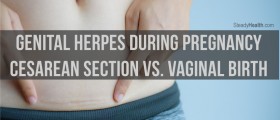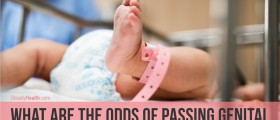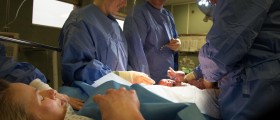
The number one worry about genital herpes is the possibility that the infection could be passed on to your baby when you give birth. Newborn herpes is exceedingly rare, but can have terrible consequences. Herpes in infants can lead to encephalitis (brain infection), liver, lung or kidney problems, and seizures among other things. In other words, herpes is something that you really do not want your baby to get. It's important to note that your baby can contract the condition if you have oral herpes too, if your baby comes into contact with cold sores. This can happen through kissing, for instance.
Likewise, a primary genital herpes outbreak in the third trimester of pregnancy can result in a fetal infection, as herpes simplex can be passed on through the placenta. Such an infection can cause birth defects and other pregnancy complications. An active first break out during delivery poses the largest risk, however. Secondary infections are not as dangerous, because you will already have built up antibodies. But if you have an impending or active outbreak of genital herpes around your due date, you will need a cesarean section to protect your baby from getting the infection. Would you like more info about sexually transmitted diseases during pregnancy? Please read Chlamydia treatment options for pregnant women too.
- www.cdc.gov/std/tg2015/herpes.htm
- www.nhs.uk/conditions/genital-herpes/
- Photo courtesy of Eduardo Garcia Cruz by Flickr: www.flickr.com/photos/128511347@N05/15758740545/

















Your thoughts on this
Loading...